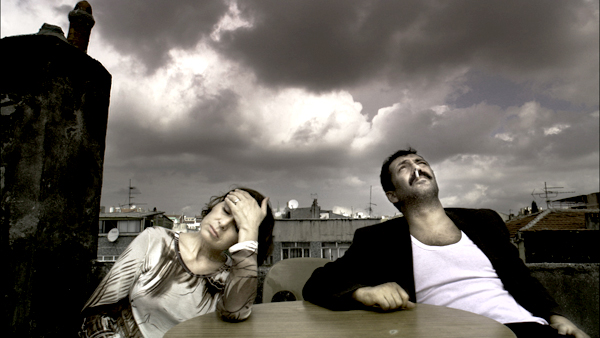|
Reviews of Recent Independent, Foreign, & Documentary Films in Theaters and DVD/Home Video

THREE MONKEYS Three Monkeys tells an old-fashioned, melodramatic story, but director Nuri Bilge Ceylan does so vividly, crossing the larger-than-life acting style of D.W. Griffith (even using shadows like scrims around the lens) with the psychological insights of Ingmar Bergman. It’s a dark and stormy night as politician Servet (Ercan Kesal) drives down an isolated, wooded road lit only by his headlights in the opening sequence. Suddenly, he’s involved in a hit and run accident, which is not directly seen. As happens throughout the film, the focus is on consequences rather than action, about what happens to a family when they choose not to hear, not to see, and not to speak as their involvement with Servet sets off a corrosive chain reaction. Eyüp (Yavuz Bingöl), Servet’s driver, could have been driving the car that night, at least that’s what the oily boss convinces him. His salary, a lump-sum payment, some jail time, and no one will be the wiser. Eyüp takes the bait. Meanwhile, his wife Hacer (Hatice Aslan) and teenage son, Ismail (Rifat Sungar), are so languorous they hardly seem to know he’s gone. By the time she realizes that her son has been hanging around the wrong crowd, Ismail’s already failed his exams and spiraled down into a depression such that he can barely get out of bed to visit his father. At this point, Ceylan starts looking at mother and son in intense close-ups surrounded by shadows. While Aslan has a tendency to widen her eyes like Lillian Gish to emote in a role with little dialogue, she is a beautifully sensual screen presence, a mature woman who thinks she is discovering freedom, only to finally realize she is just rattling her cage. (The director’s wife Ebru Ceylan is a co-writer.) Everything about her changes when she suddenly laughs and kicks off her shoes, after she, too, makes a deal with the sleazy boss, whose political fortunes have slipped since he ensnared her husband. The son’s reactions to the outward changes in his mother are unpredictable and visceral, even though he guiltily recognizes that it was his nagging for a car that drove her to make that fateful decision. The suspense builds when the father returns from prison to find out the family he thought he was protecting has also been compromised. Their increasingly claustrophobic home is no shelter from the brewing storm—their terrace juts out into the gathering clouds, the wind picks up, and the waves hit the nearby shore. (The family is often filmed in silhouette against a window that looks out on a panorama of a windblown sea.)
Then Ceylan starts looking at
the four ambiguously from a distance, as if we’re spies. Though he
doesn’t play as many visual tricks to reveal changing relationships as
in Climates, there is a lot of alternating blurring and
sharpening between distance and foreground that accents the lies within
the family. The rising tensions among them are punctuated by the wife’s
incessant cell phone ringtone, which plays the only music heard in the
film, an ironically overwrought pop love song. By the final thunder
storm, they have all slowly descended into a moral morass that is a bit
overwrought, but has been revealed through visual poetry.
Nora Lee Mandel
|

